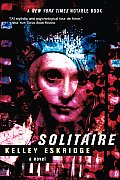
| Publisher: | Eos |
| Copyright: | 2002 |
| Printing: | 2004 |
| ISBN: | 0-06-008660-2 |
| Format: | Trade paperback |
| Pages: | 353 |
Before this review, a warning: nearly every description of this book, including the back cover text on my edition (and, to a lesser extent, the back cover text on the new printing from Small Beer Press), contains a significant spoiler for the book. This is not just setup from the first fifty pages, either; the summary spoils the first 150 pages of the book and makes it read in a much different way. I read this book knowing that spoiler, and it didn't ruin the book, but I regretted it because of the tone change in the first half of the book and the loss of uncertainty.
I'm going to try to write this review without that spoiler, which will be hard because it's so much of the interesting part of this book. But I think full enjoyment of this book for people who haven't read it is more important than being able to discuss it fully, particularly since it's an excellent book that I strongly recommend reading. So if this review is unusually nonspecific, that's why.
(Also, if this book sounds interesting, consider buying it new, either as the new trade paperback or on the Kindle. It's been out of print for a while, and was brought back into print by a small press. Resurrecting excellent but forgotten books like this is something to be monetarily encouraged.)
Jackal Segura is the Hope of Ko. Once one understands her world, that sentence explains a great deal about her, but there's a lot to unpack. Ko is a multinational corporation that borders on being its own nation-state, located somewhere in southeast Asia. The Hopes were the first children born in the first second of the new year after a world coalition government was formed, and who have become huge world celebrities, carrying the pride and honor of their countries like athletes in the Olympics magnified tenfold. Jackal is her web name, her name within the close-knit social group she has grown up with (this web has nothing to do with the Internet). Webs are one of the most interesting aspects of Ko culture, in part because Eskridge leaves them wisely unexplained. For Jackal, they're simply a fact of life, and the reader picks up some of the details (and guesses at others) as the story goes along.
The Ko culture is a little odd, and at times felt a bit too much like US stereotypes of Japanese business culture to me, but on a technical level Eskridge does a great job showing it to the reader. Exposition is woven smoothly into Solitaire's in medias res beginning without making Jackal explain things that she already knows. Perspective is also excellent; nearly all of the book is told in a very tight third person that's perfect for the material, and the exceptions are well-chosen and have significant impact.
Jackal starts the book as a bit of a cipher, since the reader is thrown into the background and Jackal's emotional turmoil at the same time and without a lot of explanation. But it starts to sort itself out after about ten pages, and by thirty pages in (about when she starts really interacting with Snow), I started liking her. That only grows over the course of the book. She's a wonderfully complex protagonist who undergoes some profound changes over the course of this book, and Eskridge wisely gives the reader significant insight into her before those changes as well as afterwards. (This is one of the reasons why the spoilers annoy me; I spent too much of the first part of the book anticipating later changes.)
Eskridge also does an excellent job with both friendship and love. This book has some of the best and most heartfelt portrayals of relationships that I've seen, largely because they're not smooth sailing. People change, often drastically, and damage hurts and hinders, and people have to try hard and don't always succeed. The emotional core of both love and friendship isn't cheapened by being made either static or easy, which is all too common. Even places that usually collapse into stock climactic resolutions in other books are handled with care and consideration for the difficulties of healing and repair. I was extremely impressed.
I don't want to say too much about the themes of the book, to avoid spoiling it, but I can say that it's a book about personal identity, about damage and survival, about what it means to be alone and what it means to be connected, and about the complicated interactions between individuals, social units, and larger frameworks. Eskridge takes the highly unusual choice of making her protagonist a project manager and then spending significant time examining what that job means and what sort of personal skills would make one exceptional at performing it. This works remarkably well, and not only within the context of a corporate culture. I wouldn't have thought an author could communicate, in an SF novel, the enthusiasm someone might feel for running projects and helping people work together, but Eskridge pulls it off and makes it compelling.
This sort of review is difficult to write, since I loved this book and want to convince others to read it but can't talk about the best parts without making them less effective. I have to settle for saying this: it's brilliant, it's going places that are far from obvious from the beginning of the book, it packs a vicious emotional punch because I cared deeply about the characters, and it has an absolutely delightful (and believable) ending that made me cry. Some of the details of the world-building are a bit sketchy, but the book wisely doesn't dwell on them. The characters and emotions are at the center, and those are spot-on.
Highly recommended.
Reviewed: 2011-05-10